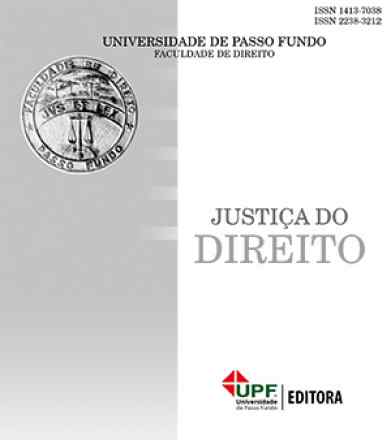Autonomia procedimental da Reclamação Constitucional
REVISTA JUSTIÇA DO DIREITO
Endereço:
Universidade de Passo FundoFaculdade de Direito, Curso de Direito. Campus – Bairro São José, Passo Fundo, RS, Brasil
Passo Fundo / RS
99001970
Site: http://seer.upf.br/index.php/rjd/index
Telefone: (05) 4331-6700
ISSN: 22383212
Editor Chefe: Liton Lanes Pilau Sobrinho
Início Publicação: 31/12/2005
Periodicidade: Trimestral
Área de Estudo: Direito
Autonomia procedimental da Reclamação Constitucional
Ano: 2022 | Volume: 36 | Número: 3
Autores: C. M. Q. de Toledo, G. A. Tomelin, P. M. Nasser
Autor Correspondente: C. M. Q. de Toledo, G. A. Tomelin, P. M. Nasser | [email protected]
Autor Correspondente: C. M. Q. de Toledo, G. A. Tomelin, P. M. Nasser | [email protected]
Palavras-chave: autoridade, constitucional, processual, reclamação, tribunais
Resumos Cadastrados
Resumo Português:
A reclamação processual é instituto do processo civil pelo qual as cortes de justiça podem fazer valer a autoridade de suas decisões. Nasceu o instituto de reiteradas decisões jurisprudenciais, e acabou inserido na legislação e nos regimentos dos tribunais. A Constituição da República e suas emendas promoveram um retraçado das linhas gerais, da utilidade e da natureza jurídica da reclamação, agora como reclamação de natureza constitucional. Os tribunais ganham autonomia para fazer valer a jurisprudência vinculante e para autoafirmar a função nomofilácica das cortes brasileiras. O método utilizado neste estudo foi a pesquisa bibliográfica histórico-comparativa sobre os momentos constitucionais e processuais de evolução do tema em doutrina e jurisprudência. Assim, o presente artigo promove a releitura da reclamação processual à luz das inovações constitucionais e legais, pelas quais se reorganizou o tema depois do Código de Processo Civil de 2015.
Resumo Inglês:
The procedural claim is an institute of the civil process by which the courts of justice can assert the authority of their decisions. This institute emerged from repeated jurisprudential decisions and ended up being inserted in the legislation and in the courts’ administrative regulations. The Constitution of the Republic and its amendments promoted a retracing of its general lines, the usefulness and the legal nature of the procedural claim, now as claim with constitutional nature. The courts gain autonomyto enforce the binding jurisprudence and to self-affirm the nomophylactic function of the Brazilian Courts. The method used here was historical-comparative bibliographical research on the constitutional and procedural moments of evolution of the theme in doctrine and jurisprudence. Thus, this article promotes the re-reading of the procedural claim in the light of constitutional and legal innovations, by which the theme was reorganized after the Code of Civil Procedure of 2015.

